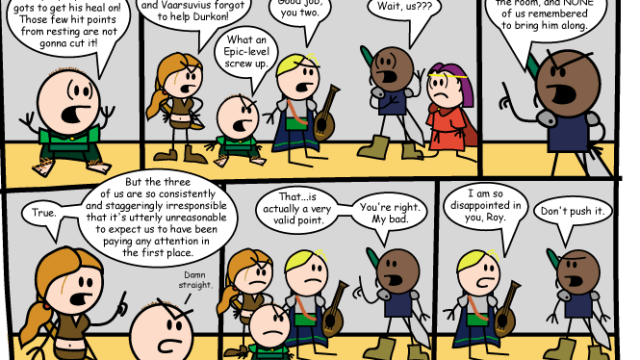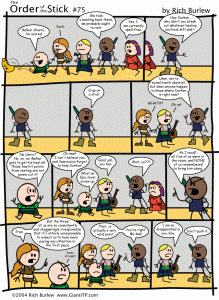This early strip of The Order Of The Stick is obviously amusing, but I’m also struck by how it crushes the entire emotional arc of its protagonist into only a few panels. Regular readers may remember that I initially found Roy Greenhilt an insufferable fucking prick who couldn’t give you the time of day without making a speech out of it and, on top of that, how stupid you were for not owning a watch. I kept with the comic because character likability has never been a high priority of mine – Roy is complex and interesting in himself, and he is contextualised within both the party he runs and the wider world he’s moving through. But I also have to concede that he hasn’t been an insufferable prick for, like, a book and a half at this point. Roy is motivated by the desire to be a good person; he has a way of cutting (or cleaving, I suppose) to the heart of a matter, quantifying a complex situation and calculating the outcome he finds most aligned with his personal morals. At the beginning of the series, his larger philosophical goal is to get everybody to recognise and agree with his correctness; it makes him very funny but – and I think he’d now agree with this even if he wouldn’t word it that way – it’s also a fucking stupid way to live.
His relationship with Miko is where he gets an early inkling of this. Miko is famous on her own terms as a parody of how D&D players generally used to play paladins – righteous, unbending, and most importantly, forcing everyone around them to go along with their morality* – but she also works as a more general take on a certain kind of idealist, and even better as a kind of shadow archetype to Roy himself. He is initially attracted to her – literally, for reasons that would probably be clearer if the art weren’t so simplistic, but also in the sense that he is relieved to meet someone who seems to take being a good person as seriously as he does. He tries talking to her the way he understands the world and is repeatedly shocked to find it doesn’t change her mind. It culminates in him giving her one of his patented Greenhilt righteous fury speeches… to which she responds by beating the shit out of the Order and dragging them to Azure City. Like all dramatic situations, clear principles emerge: being angry and even being right about it means jack shit in the face of power, empathy from others is not guaranteed no matter how well you word it, and fuck you for thinking otherwise.
*This was encouraged by how paladins were constructed at the time as a gameplay element; they had to be Lawful Good or they would lose their powers. Today’s paladins are more flexible and better balanced.
But Miko serves a more esoteric and even more important element in the story: she is a shadow to Roy. One thing that drives Roy’s development even more than his rationality or his principles or his sense of right and wrong is his willingness to see himself in other people, even and perhaps especially people he doesn’t like. Part of his righteous anti-Miko speech is him admitting that he had done some of the things she had done, but that he saw what it had gotten her and would choose not to do it in the future. Both aspects of Miko end up setting Roy up for resolving his issues with his father – I think what Roy initially wanted even more than to save the world was for Eugene to admit that he was wrong, and he expends a tremendous amount of emotional energy over the course of the story reasoning with him, arguing with him, berating him, and generally trying to own him. People tend to use arguments that they themselves would be convinced by, and Roy keeps trying to use the shame on his father that he would feel in his place.
Now, I may make fun of Roy for giving Eugene a long, self-righteous speech about how he won’t bother giving him any more long, self-righteous speeches, but it is clear that after that point, Roy pulls the rod out of his butt. I’m talking myself into the idea that Roy’s arc has led to him having a Monster morality – not in the sense of being nonviolent, but in the sense that he is focused less on punishing evil and more on repairing the world of its effects. It’s like once he gives Eugene permission to have whatever inner life he so chooses, he finds it easier to give that permission to the rest of the world. Forgiveness isn’t about only feeling good feelings about everyone no matter what they did to you – it does give Roy a huge sense of closure to know that his father is not going to heaven because of his actions – it’s about letting go of anger that simply drives you to bitterness. Roy stops letting the spirit of a thing get in the way of the facts, and it makes him a more effective hero and a more affectionate person. Now that Eugene is no longer a danger to anyone, who cares that he’s a bastard? If Belkar keeps saving people, who cares that he does it because he loves killing?


